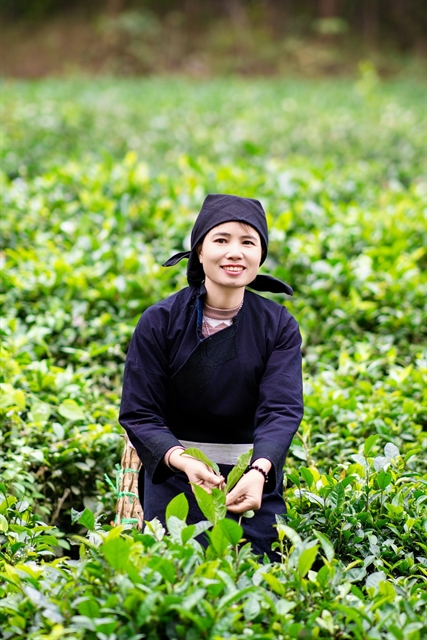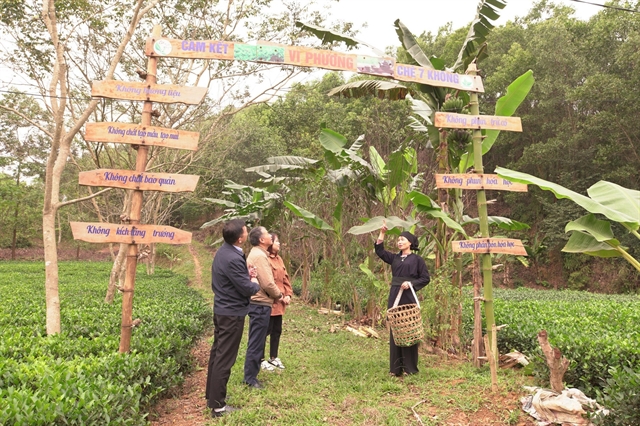 Society
Society


|
| Phương takes care of the tea plants in her farm. — VNA/VNS Photo Hương Hiền |
THÁI NGUYÊN — Vi Thị Phương, a woman from the Nùng ethnic group in Thái Nguyên northern province, the country's largest tea-growing area, has become a typical example of a pioneer in organic agricultural production that is receiving great attention locally.
Like many households in Quang Sơn Commune, Đồng Hỷ District, Phương's family previously mainly engaged in traditional tea cultivation practices.
For years, they were entangled in the routine of using chemical fertilisers, pesticides, harvesting, drying and selling at the market. With a strong connection to tea since childhood, Phương has a deep understanding of the characteristics of tea plants and the common pests and diseases that affect them.
The harvest time is when pests proliferate rapidly.
To ensure tea productivity, regular pesticide spraying is essential. Despite adhering to the recommended isolation periods for each spray, Phương felt that the residual chemicals on the tea bushes remained.
Moreover, insecticides and herbicides not only kill the pests and weeds, but also lead to the death of microorganisms in the soil. Faced with these challenges, she nurtured a persistent desire to introduce clean, safe, and high-quality tea products to the market, leaning towards organic practices.
This initiative not only contributes to a healthier environment for growers and consumers but also adds greater value to each tea bud.
At the entrance to her tea farm, Phương has built a gate adorned with signs bearing the messages: No artificial flavourings, no artificial colourings, no preservatives, no growth stimulants, no chemical weed spraying, no chemical spraying, no chemical fertilisers.
This codifies her commitment to producing a distinctively clean and safe tea product.
"The organic tea cultivation method, although more costly in terms of expenses and time, is entirely environmentally friendly. The most crucial aspect is the safety of both the tea cultivators and consumers," Phương told Dân Tộc và Miền Núi (Ethnic Affairs and Mountainous Region) newspaper.
"My organic tea stands out significantly from normal types. The tea infusion retains a consistent lemon-yellow colour through multiple infusions."
With unwavering determination, a desire for change, and the dedicated guidance of experts, Phương has transformed traditional tea products into safe, organic tea with high economic value, promoted in many places both inside and outside the country.
To enhance her knowledge of innovative tea-making methods, Phương has participated in courses on bioproduct production techniques.

|
| The entrance to Phương's tea farm adorned with signs representing her commitment to producing organic tea. |
Particularly, in 2022, she joined a training programme on entrepreneurship and the application of microbiological technology in cultivation, jointly organised by the US Embassy, the provincial cooperative alliance and the farmers' union.
She has access to proven methods of agricultural production that emphasises circularity, sustainability and the utilisation of local resources.
Applying the knowledge she acquired, Phương persistently implemented step-by-step changes on her family's tea plantation. She came up with a way to intercrop tea and bananas.
Phương placed sacks of decomposed wild grass around the tea and banana plants, creating on-site fertiliser.
Growing bananas helps increase the soil's fertility, providing natural potassium.
The lemongrass and chili plants, planted to create a natural fence, also serve as raw materials for herbal insecticides.
Phương also personally produces various organic fertilisers to nurture her nearly 4,000sq.m of tea.
By diligently applying what she has learned, she no longer spends money purchasing fertilisers and pesticides as before. She only needs to buy the raw materials for making her bio-products.
The production of these organic fertilisers takes about 10 to 15 days of fermenting beneficial microorganisms.
She has successfully created four different types of bio-products from microbial-based fermentation.
The microbial products and organic fertilisers are made from clean water, yogurt, sugar, digestive enzymes, yeast and rice bran.
After implementing this cultivation method, the quality and yield of her tea have significantly improved, she said.
The tea leaves are greener and thicker, and the tea has a sweeter and more aromatic flavour.
Instead of having to bring her tea to the market as before, customers now come to her to order.
The price of tea has increased from VNĐ100,000 to VNĐ500,000 per kilo.
Phương's tea products are even consumed abroad, including Switzerland, the Netherlands, Laos and Thailand.
Triệu Văn Lũy, the Secretary of the Party Committee in Quang Sơn Commune, said tea is not the primary strength of Quang Sơn Commune, but Phương has created a distinctive mark by producing organic tea.
"Her goal is to provide organic tea, ensuring the health of consumers. Phương's model is exemplary in circular agriculture, safeguarding health, and maintaining a balance in the natural ecosystem, and it should be replicated."
Recently, Phương has established an organic tea production group in La Giang village with 17 members, most of whom are Nùng ethnic people, to support and help people in producing organic tea.
Quang Sơn Commune will actively support and build the local organic tea products, aiming for it to soon become an One Commune One Product (OCOP) certified organic brand, Lũy said. — VNS




